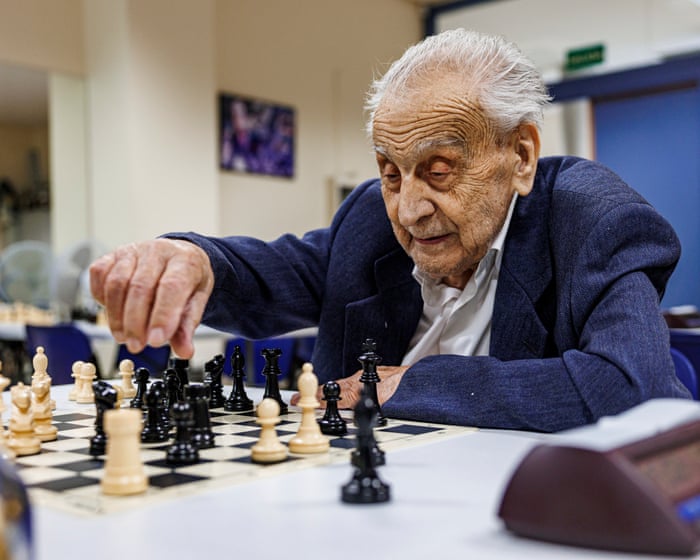The year Manuel Álvarez Escudero learned to play chess, fascist bombs fell on Guernica, a tragedy immortalized in Pablo Picasso’s vast monochrome painting. That same year, the Hindenburg burst into flames over Lakehurst, and John Steinbeck released his short novel, Of Mice and Men.
Ninety years later, Álvarez’s passion for chess has only grown. On a Saturday morning just after 10 a.m., the 104-year-old from Madrid—thought to be the world’s oldest active registered chess player—stepped off a bus in the southern part of the city. Using his homemade walker, he made his way to the cultural center where he plays his weekly matches.
Though his hearing has faded with time, Don Manuel, as his friends at the Valdebernardo chess club fondly call him, has kept both his sharp memory and his sense of humor.
His walker, a product of his engineering background, is something he built himself.
“I was around 16 when my older brother taught me chess,” he recalled, settling before the board in a room that also serves as a fitness space, with exercise mats and balls stacked in the corners. “I thought he was really good, but back then I didn’t know anything. Neither of us had a clue what we were doing.”
It wasn’t until a few years later, when a coworker challenged him and pointed out how much he still had to learn, that Álvarez realized how little he knew. After several tough lessons—including an introduction to the Muzio variation of the King’s Gambit—he began to improve.
Just as designing and building his own lightweight walker lets him apply his engineering skills, chess allows him to engage his love for math and problem-solving.
While he believes the game has helped keep his mind sharp, Álvarez says its greatest gift has been the friendships it has brought him.
“What I love most are all the friends I’ve made through chess,” he said. “So many good friends—and they’re still my friends.”
All of his engineering classmates have since passed away. Like them, Álvarez—who once thought he might live to 80 if he was lucky—was fortunate to survive his teenage years, not to mention go on to marry, raise three children, and welcome two grandchildren and two great-grandchildren.
“I lived through the civil war in Madrid, and it was terrible,” he said. “There was so much hunger, so many bombs. It was awful. My father died of esophageal cancer in 1937.”
He credits his long life in part to avoiding smoking and drinking. One of his brothers lived to 98—he never smoked. The other two did, and they died younger.
Álvarez’s own indulgences are modest: chess, playing the football pools, and card games—“though that’s a harmless vice.” A recent bout of gout has also prompted him to cut back on jamón.
Don Manuel is deeply cherished by his friends at the club, whose 130 members come not only from Spain but also from Syria, Lebanon,Bulgaria, Azerbaijan, Brazil, and Venezuela. The high regard the wider chess community has for him was clear at the rapid chess tournament held in a local sports center earlier this month to celebrate his 104th birthday.
“He’s a very important person for us, mainly because of his values,” said José Luis Uceda Aragoneses, the club’s president.
The chess veteran plays a game against 97-year-old Marcela Minguito Sánchez. Photo: Pablo Garcia/The Guardian
“When he was a bit younger, he was always the first to come and help set up. Now he can’t, but he would always be here first—even at 100—and he’d put out all the chess sets. He always has a friendly word for everyone, and he’s the kind of person you love because he deserves it.”
As he got ready for a game with Marcela Minguito Sánchez (a spry 97-year-old), Álvarez found it hard to picture what his life would have been like if his brother hadn’t introduced him to the joys and frustrations of chess 88 years ago.
“Really boring,” he said. “It’s brought me so many friends and so much fun. My life would have been completely different without chess.”
The game has also given him some advice he’s glad to pass on. “You need to learn how to lose,” he noted. “You can learn a lot by losing.”
So, after a long life filled with countless battles on the black and white squares, is the ultimate lesson that neither winning nor losing is truly important?
“No!” Álvarez replied. “I like winning. But if I lose, it doesn’t bother me too much.”
Frequently Asked Questions
Of course Here is a list of FAQs about You can learn a lot by losing inspired by Don Manuel the 104yearold chess player
General Beginner Questions
1 What does you can learn a lot by losing actually mean
It means that failures and setbacks provide unique powerful lessons that winning often doesnt They show you exactly where your weaknesses are and what you need to improve
2 Who is Don Manuel
Don Manuel is a 104yearold chess player who has become an inspiration His long life of playing chess has taught him that every loss is a new opportunity to learn and grow both in the game and in life
3 Isnt losing just losing How is it helpful
Losing feels bad but its a direct feedback mechanism It highlights a specific mistake a flawed strategy or a gap in your knowledge giving you a clear target for what to work on next
4 I get discouraged when I lose How can I change that
Try to shift your mindset Instead of seeing a loss as a failure see it as a datagathering mission Ask yourself What one thing can I learn from this This turns a negative emotion into a productive action
5 Can this idea be applied to things other than games like work or school
Absolutely Whether you miss a sales target get a poor grade or a project fails the principle is the same Analyzing why it happened is the fastest way to prevent it from happening again and to perform better in the future
Deeper Advanced Questions
6 How does someone like Don Manuel maintain a positive attitude after so many losses over 100 years
He likely separates his selfworth from the outcome of the game His identity isnt a winner or a loser its a lifelong learner The joy comes from the process of learning and playing not just from the final result
7 Whats the biggest mistake people make after they lose
The biggest mistake is to get emotional and dismiss the loss as bad luck or their opponents fluke This prevents them from doing an honest review and extracting the valuable lesson
8 How can I effectively analyze a loss to get the most out of it
Do a simple postmortem After the game calmly



